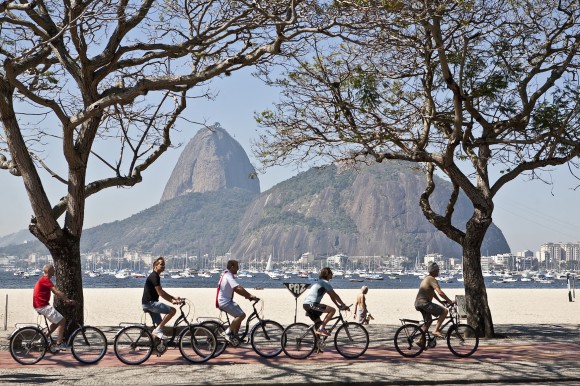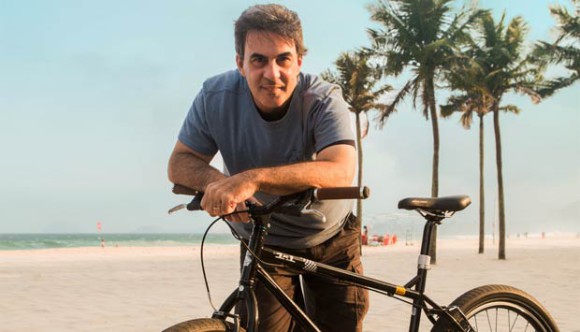
Cycling success story from Rio de Janeiro
 Source: Riocharm.com.br
Source: Riocharm.com.br
With the world’s spotlight on Rio de Janeiro and football this year, we thought we would share something a bit different from the booming Brazilian city. The Transporte Ativo (Active Transportation) NGO has taken huge strides in transforming the city into a cycle friendly metropolis as a key part of its aim to promote active mobility.
Transporte Ativo, managed by Zé Lobo, became a member of ECF’s new World Cycling Alliance (WCA) at its founding at Velo-city Global in Adelaide this year. The WCA’s aim is to build a global network of NGOs with an interest in promoting cycling. Besides advocating for cycling on the international level, the WCA also aims to promote knowledge-sharing between NGOs. With its many successes in Rio, Transporte Ativo is a perfect example to showcase the wealth of knowledge that these NGOs possess.
Not only are there 420,000 bike trips per day in Rio, Zé Lobo’s CycleLogistics study has also found that 38% of bicycle trips in Rio are for delivering goods. Armed with these figures, Transporte Ativo has been able to persuade the municipalities to start investing more resources into cycling. Zé Lobo’s initial achievements were in influencing the urban planning of the Copacabana neighbourhood. His concerted efforts have led to the development of cycle lanes and a 30km speed limit. He has also influenced the setting up of a city-wide bike-share scheme and an annual car-free day in Rio.
 Zé Lobo, Managing Director and Founder of Transporte Ativo
Zé Lobo, Managing Director and Founder of Transporte Ativo
One of the main draw cards for the municipalities has been to improve the safety and working conditions for those using cycles for deliveries. However, investing in cycling infrastructure has had the effect of promoting cycling to the wider population. After the initial successes in Copacabana, other neighbourhoods of Rio are starting to benefit too with plans to expand the cycle lanes even further.
The project Cycle Routes for Rio City Center (Ciclo Rotas Centro) is Zé Lobo’s new success story. In an attempt to encourage people to cycle to their workplaces, the initiative aims to link the existing cycle lanes from Copacabana to a new network of cycle lanes within downtown Rio. The pre-approved proposal foresees a 33km network of inner-city cycle lanes in what are traditionally more car-dominant areas. By ensuring that cycling is part of the municipalities planning, Zé Lobo is bringing Rio one step closer to having a multi-modal transport structure.
Zé Lobo’s successes have not gone unnoticed. He was recently invited by the President of Brazil to represent cycling in a mobility discussion in response to protests leading up to the FIFA World Cup. In 2007, he won the prestigious Pedala Brazil award as ‘best promoter’ of cycling in Brazil. He is also on the Board of Transportation of the City of Rio de Janeiro.
The WCA provides the perfect platform for Zé Lobo to share his experiences and lessons learnt from promoting cycling and engaging municipalities. ECF is honored to have such an experienced and successful member in the growing network.
About the Author
Acacia Smith is a Communications Assistant at the European Cyclists' Federation. Prior to joining ECF, she worked for the research company TNS-Opinion on the 2014 European elections and she has a background in European Affairs and Environmental Studies. She is especially interested in issues of urban sustainability in the context of climate change.
- Log in to post comments
Contact the author
Recent news!
Upcoming events
Contact Us
Avenue des Arts, 7-8
Postal address: Rue de la Charité, 22
1210 Brussels, Belgium










